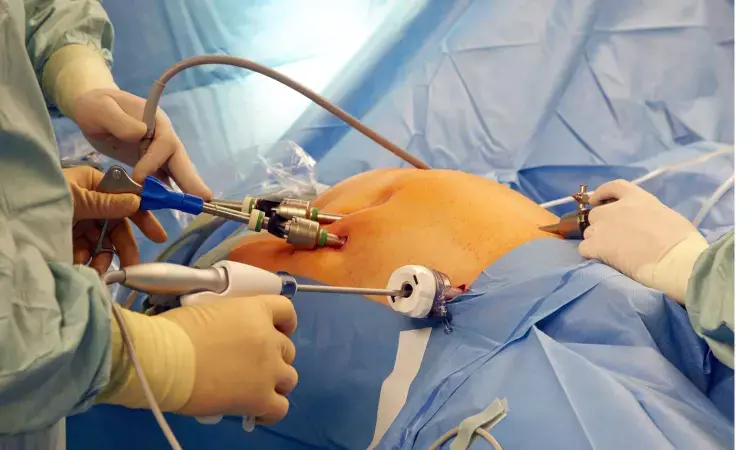- Home
- Medical news & Guidelines
- Anesthesiology
- Cardiology and CTVS
- Critical Care
- Dentistry
- Dermatology
- Diabetes and Endocrinology
- ENT
- Gastroenterology
- Medicine
- Nephrology
- Neurology
- Obstretics-Gynaecology
- Oncology
- Ophthalmology
- Orthopaedics
- Pediatrics-Neonatology
- Psychiatry
- Pulmonology
- Radiology
- Surgery
- Urology
- Laboratory Medicine
- Diet
- Nursing
- Paramedical
- Physiotherapy
- Health news
- Fact Check
- Bone Health Fact Check
- Brain Health Fact Check
- Cancer Related Fact Check
- Child Care Fact Check
- Dental and oral health fact check
- Diabetes and metabolic health fact check
- Diet and Nutrition Fact Check
- Eye and ENT Care Fact Check
- Fitness fact check
- Gut health fact check
- Heart health fact check
- Kidney health fact check
- Medical education fact check
- Men's health fact check
- Respiratory fact check
- Skin and hair care fact check
- Vaccine and Immunization fact check
- Women's health fact check
- AYUSH
- State News
- Andaman and Nicobar Islands
- Andhra Pradesh
- Arunachal Pradesh
- Assam
- Bihar
- Chandigarh
- Chattisgarh
- Dadra and Nagar Haveli
- Daman and Diu
- Delhi
- Goa
- Gujarat
- Haryana
- Himachal Pradesh
- Jammu & Kashmir
- Jharkhand
- Karnataka
- Kerala
- Ladakh
- Lakshadweep
- Madhya Pradesh
- Maharashtra
- Manipur
- Meghalaya
- Mizoram
- Nagaland
- Odisha
- Puducherry
- Punjab
- Rajasthan
- Sikkim
- Tamil Nadu
- Telangana
- Tripura
- Uttar Pradesh
- Uttrakhand
- West Bengal
- Medical Education
- Industry
Bariatric surgery reduces MACE and mortality risk in obese patients with sleep apnea

USA: Bariatric surgery improves the symptoms of obstructive sleep apnea (OSA) in patients with obesity and also largely reduces or eliminates cardiovascular complications, says a recent study. The study from Cleveland Clinic and presented here today at the American Society for Metabolic and Bariatric Surgery (ASMBS) 2023 Annual Scientific Meeting.
The study found that bariatric surgery, also called weight-loss or metabolic surgery, was associated with a 42% lower risk of MACE (major adverse cardiovascular events), including stroke, heart failure, heart attack, and atrial fibrillation in patients with moderate to severe OSA. Researchers also report metabolic surgery patients cut their risk of death by nearly 40%.
OSA is a dangerous sleep disorder that effects nearly 1 billion adults worldwide-about 70% also have obesity. Obesity can cause excess fat to deposit around the upper airway, which can compress the upper airways and interfere with breathing during sleep. Standard treatment is with continuous positive airway pressure (CPAP), but the therapy only addresses symptoms, is not curative and does not reduce the risk of MACE or death, which has a high incidence among patients with OSA.
“No other therapy has been shown to reduce the risk of dying or developing heart attack or heart failure in patients with obesity and obstructive sleep apnea,” said the study lead author Ali Aminian, MD, Director of Bariatric and Metabolic Institute at the Cleveland Clinic and a Professor of Surgery at the Cleveland Clinic Lerner College of Medicine. “Bariatric surgery is a very powerful tool that can help patients with sleep apnea live longer and healthier lives.”
In the cohort study of 13,657 Cleveland Clinic patients with a diagnosis of obesity and moderate to severe OSA, 970 patients had gastric bypass or sleeve gastrectomy while 12,687 matched patients received CPAP or usual non-surgical care between 2004 and 2018. Patients were followed until September 2022 for MACE, a composite of all-cause death or cardiovascular disease.
After 10 years, MACE occurred in 27% of patients in the bariatric surgery group compared to 35.6% in the nonsurgical group. All-cause mortality was also 37% less for bariatric surgery patients (9.1% vs. 12.5%) who maintained about a 25% weight loss compared to the under 5% weight loss in the nonsurgical group.
“Bariatric surgery not only improves the symptoms of obstructive sleep apnea in patients with obesity, but largely reduces or eliminates the cardiovascular complications that can often occur alongside it compared to routine care,” said Teresa LaMasters, MD, President, ASMBS and a bariatric surgeon and board-certified obesity medicine physician, who was not involved in the study. “Patients and their doctors should strongly consider this option and determine if it’s right for them. Further studies may explore the threshold of weight loss required for optimal clinical impact on outcomes.”
The ASMBS reports only about 1% of those who meet eligibility requirements get weight-loss surgery in any given year. In 2020, the number of bariatric procedures dropped to less than 200,000, the lowest in four years, due to cancellations or deferrals during the height of the COVID-19 pandemic. Procedures appeared to have rebounded in 2021, but official estimates are not yet available.
According to the U.S. Centers for Disease Control and Prevention (CDC), obesity effects 42.4% of Americans. Studies show the disease can weaken or impair the body’s immune system and cause chronic inflammation and increase the risk of many other diseases and conditions including cardiovascular disease, stroke, type 2 diabetes, certain cancers, and COVID-19.
Dr Kamal Kant Kohli-MBBS, DTCD- a chest specialist with more than 30 years of practice and a flair for writing clinical articles, Dr Kamal Kant Kohli joined Medical Dialogues as a Chief Editor of Medical News. Besides writing articles, as an editor, he proofreads and verifies all the medical content published on Medical Dialogues including those coming from journals, studies,medical conferences,guidelines etc. Email: drkohli@medicaldialogues.in. Contact no. 011-43720751


